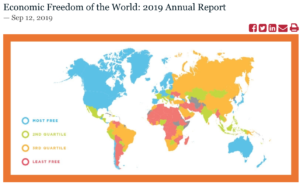Notes on European Union Immigration Reform
For thousands of years people have migrated into, across, and out of Europe. Usually peacefully but sometimes as invading armies. Economic principles will help students understand and appreciate the dynamic forces driving E.U. immigration and policies.
Levels of economic freedom varies from country to country across the E.U. (and state to state in the U.S.). Outside the E.U. far less economic freedom is a source of continued poverty and conflict. See the Fraser Institute’s Economic Freedom of the World Index for more.
People migrate from less free states and countries to safer and freer countries and cities where there are opportunities for higher income.
Economic theories show how immigration tends to raise wages and increase economic opportunities. There is sound empirical research to support this claim. But that doesn’t mean immigration helps everyone equally. Some lower-skilled local worker face downward wage pressures, while others gain as new immigrants tend to lack local knowledge and language skills.
Below are recommended books and articles on the economics of immigration, especially E.U. immigration. But first…
A detour through travel and tourism.
Visitors to Europe see beautiful scenery from mountains to rivers, canals, and coastlines. Some 540 million tourists visited Europe in 2019 visiting historic cities, villages, castles, churches, and monasteries.
But why is tourism a popular and important part of the economies of Europe, yet guest workers and immigration remain controversial? Labor regulations and welfare policies are part of the explanation.
A visit of a few weeks or a few months can be okay, but for tourists wanting to stay longer and wanting to work part-time (maybe at a debate camp) face challenges. Getting a permit for legal employment is complicated both in the U.S. and the E.U. Why should that be?
Here we find a mystery between tourism and longer-term visits. Immigration restrictions are labor-law regulations. It’s okay to visit, but not for too long, and apparently it’s not okay to earn money without a permit. State regulations limit working and living.
Freedom to move from country to country across Europe lasted for centuries until World War I. Passports were a temporary wartime measure, but are still in force. Everyone needs papers to travel from country to country (though not within the U.S. or E.U.)
Europe was devastated by World War I and never fully recovered pre-war freedoms. Students researching E.U. immigration should be familiar with key past events and how they impacted immigration. The major recent event was the 2015 Syrian war and refugee crises. Before that the fall of communism brought extensive migration, and before that the migration of World War II refugees, then guest workers as Germany and the rest of Europe recovered from the destruction of war.
Before the industrial revolution through the eighteenth century, travel was too costly so most people lived not far from where they were born. Merchants traveled for trade and soldiers traveled for wars. Christians traveled for pilgrimages and earlier Christian soldiers for the Crusades. But again, no restrictions on migration in Europe before World War I:
Before 1914, migration had been peaceful and driven by market incentives. Since 1914, it has been shaped by politically determined quotas, legal restrictions, and flights from wars and oppression. (August 1914 and the end of unrestricted mass migration, VoxEU, June, 2014)
Books and Articles on the Economics of E.U. Immigration
• The Economics of Immigration: Market-Based Approaches, Social Science, and Public Policy,
Ben Powell (Oxford Univ. Press, 2015)
• the economics of migration, (Contexts, June 10, 2019)
• Spain/Morocco: Africa’s Gateway to Europe (Vox)
• Amid an Unfolding Humanitarian Crisis in Syria, the European Union Faces the Perils of Devolving Migration Management to Turkey (MPI, March 20, 2020)
• Let Their People Come: Breaking the Gridlock on Global Labor Mobility (CGD)
• The Progressive’s Immigration Dilemma (Adam Smith Institute, April 27, 2015)
• The Strange Death of Europe: Immigration, Identity, Islam, (2018) Link to book review.
The Strange Death of Europe: Immigration, Identity, Islam (Heritage Fd. June 22, 2017)
• Chandran Kukathas: Controlling Immigration Means Controlling Citizens (Mercatus Center, April 25, 2017)
• Closed Borders: The Contemporary Assault on Freedom of Movement (Twentieth Century Fund, Yale Univ. .Press, 1987)
